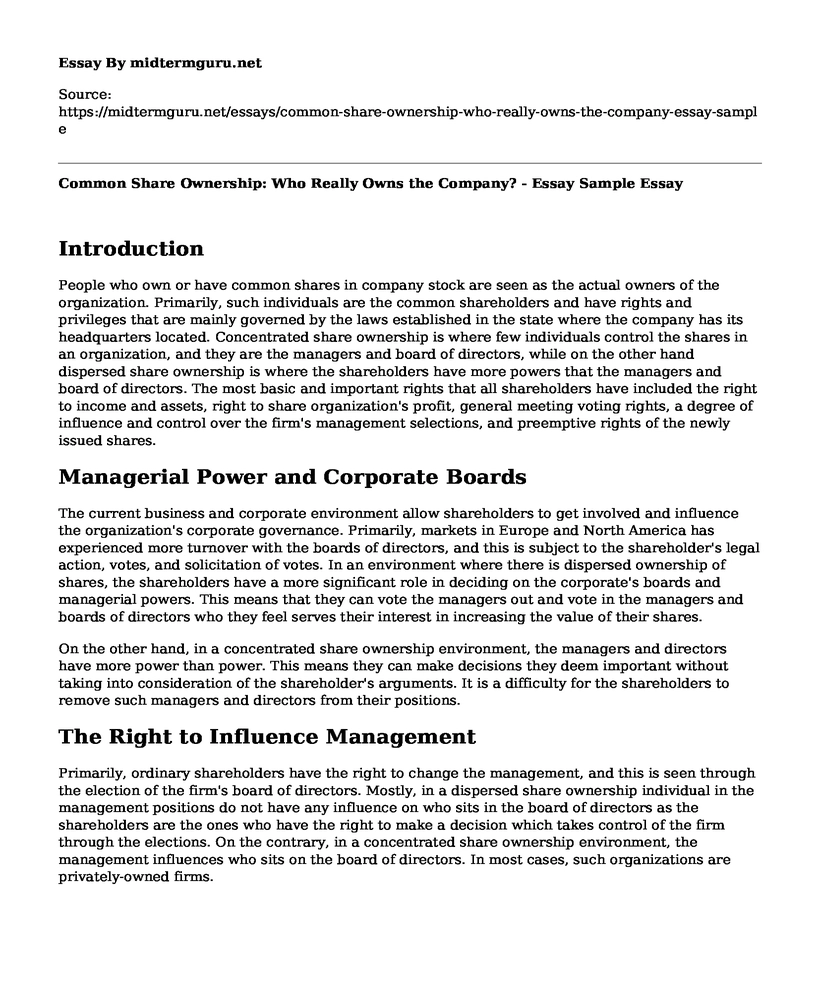Introduction
People who own or have common shares in company stock are seen as the actual owners of the organization. Primarily, such individuals are the common shareholders and have rights and privileges that are mainly governed by the laws established in the state where the company has its headquarters located. Concentrated share ownership is where few individuals control the shares in an organization, and they are the managers and board of directors, while on the other hand dispersed share ownership is where the shareholders have more powers that the managers and board of directors. The most basic and important rights that all shareholders have included the right to income and assets, right to share organization's profit, general meeting voting rights, a degree of influence and control over the firm's management selections, and preemptive rights of the newly issued shares.
Managerial Power and Corporate Boards
The current business and corporate environment allow shareholders to get involved and influence the organization's corporate governance. Primarily, markets in Europe and North America has experienced more turnover with the boards of directors, and this is subject to the shareholder's legal action, votes, and solicitation of votes. In an environment where there is dispersed ownership of shares, the shareholders have a more significant role in deciding on the corporate's boards and managerial powers. This means that they can vote the managers out and vote in the managers and boards of directors who they feel serves their interest in increasing the value of their shares.
On the other hand, in a concentrated share ownership environment, the managers and directors have more power than power. This means they can make decisions they deem important without taking into consideration of the shareholder's arguments. It is a difficulty for the shareholders to remove such managers and directors from their positions.
The Right to Influence Management
Primarily, ordinary shareholders have the right to change the management, and this is seen through the election of the firm's board of directors. Mostly, in a dispersed share ownership individual in the management positions do not have any influence on who sits in the board of directors as the shareholders are the ones who have the right to make a decision which takes control of the firm through the elections. On the contrary, in a concentrated share ownership environment, the management influences who sits on the board of directors. In most cases, such organizations are privately-owned firms.
Facilitating Collective Action
The dispersed shareholders have a more substantial bargain when it comes to governance. Primarily, the diffuse stock ownership presents that shareholders with a formidable collective actions problem when they attempt to their control rights. The small shareholders can exercise their voting rights, and they do this through proxy solicitation, mail voting, and proxy voting through agents or custodial firms. For instance, the Japanese law permits for mid-size and large firms to select their proxy from though mail voting. Adaptationally, France, and Germany allow organizations to go for distance voting. Such laws and consideration give the shareholder a say on who will be selected in the board of director position.
Conclusion
In conclusion, shareholders have several rights, and they mainly exercise them through voting. However, such rights depend on the environment the organization is operating and whether the shares are dispersed owned or concentrated ownership.
Cite this page
Common Share Ownership: Who Really Owns the Company? - Essay Sample. (2023, Jan 11). Retrieved from https://midtermguru.com/essays/common-share-ownership-who-really-owns-the-company-essay-sample
If you are the original author of this essay and no longer wish to have it published on the midtermguru.com website, please click below to request its removal:
- Case Study: Fisher vs The University of Texas at Austin
- Tesla Case Study Paper Example
- Letter for Alkermes Inspiration Grant: Free Drug Community
- Paper Example on Starbucks Australia Failure
- Research Paper on Blood Spatter Interpretation
- The Rules And Regulations For A Foreign Company To Start And Operate A Business In The UAE
- HP: Corporate Politics Affecting CEO Changes Since 2005 - Essay Sample







